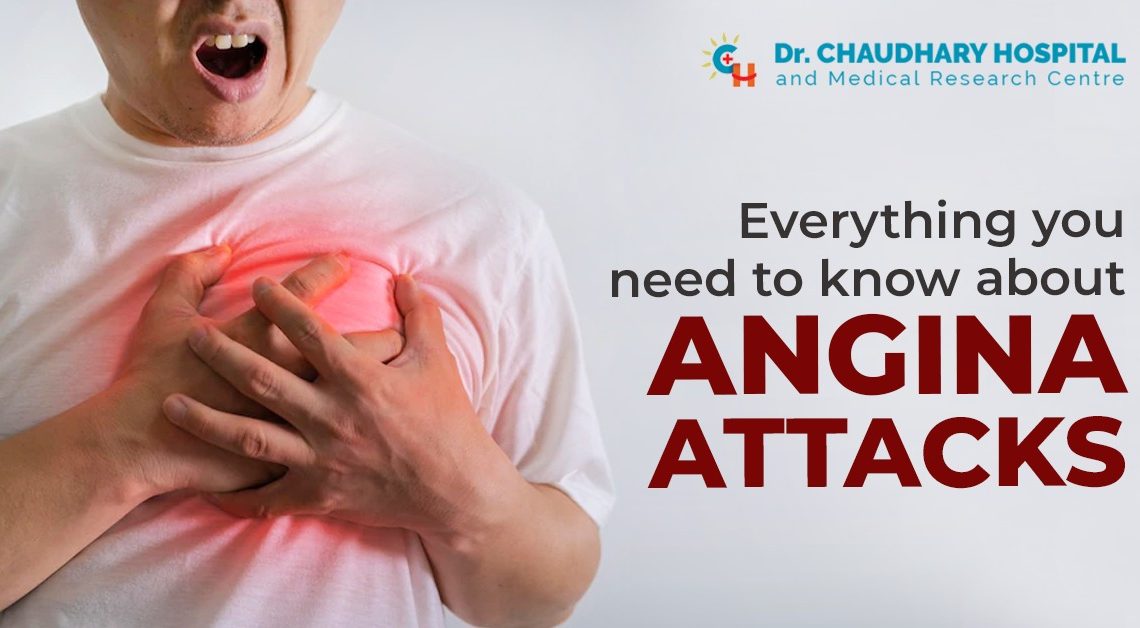Angina attacks is a sensations of pain, pressure, or tightness in the chest. When a portion of the heart does not get enough oxygen, angina occurs. Although angina is relatively common, it can still be hard to distinguish from other types of chest pain, such as the discomfort of indigestion. The moment you experience unexplained chest pain, get medical help.
Angina can be of different types and can have distinctive symptoms. Let us learn more about angina, its causes and treatment.
What is Angina Attack?
- Angina attack is chest pain that develops when not enough blood is flowing to a certain area of your heart. Your chest may feel squeezed or under pressure, simulating a heart attack. It’s also known as ischemic chest pain or angina pectoris.
- It occurs when something obstructs your arteries or when there is insufficient blood flow in the arteries that provide oxygen-rich blood to your heart. It is a symptom of heart disease.
- Angina usually goes away quickly. Even so, it can be a symptom of a serious heart condition. To prevent a heart attack, it’s critical to understand what’s happening and what you can do.
- Angina attacks are typically manageable with medication and dietary modifications. You might require surgery as well if it’s more serious.
Types of Angina
Stable Angina
This is the most common type of angina. It might be triggered by stress or physical exertion. It typically lasts for a short while and goes away when you rest. Although it isn’t a heart attack, it may indicate that you’re more likely to experience one. If you experience this, consult a doctor.
Unstable Angina
You can have this while you’re at rest or not very active. The discomfort may be severe and persistent, and it might recur frequently. Consult a doctor right away because it can be an indication that a heart attack is about to occur.
Microvascular angina
With this kind, there is no coronary artery obstruction but there is chest pain. Instead, it occurs because your heart isn’t getting the blood it needs because your tiniest coronary arteries aren’t functioning properly. Usually, the chest pain lasts for longer than 10 minutes. Women are more prone to this type.
Prinzmetal’s angina (variant angina)
This kind is uncommon. It might occur while you’re asleep or relaxing at night. Your heart’s arteries suddenly constrict or tighten. You should get it addressed because it can be really painful.
Angina Symptoms
Chest pain is a symptom, but it affects people differently. You may have:
- Aching
- Burning
- Discomfort
- Dizziness
- Fatigue
- The feeling of fullness in your chest
- The feeling of heaviness or pressure
- Upset stomach or vomiting
- Shortness of breath
- Squeezing
- Sweating
The area below your breastbone is likely to hurt, and it may radiate to your shoulders, arms, neck, throat, jaw, or back. With rest, stable angina frequently improves. Angina that is unstable might not, and it might get worse. There is an urgent need for medical attention.
What Causes Angina Attacks?
Heart disease is typically the cause of angina. A fatty substance called plaque builds up in your arteries, limiting blood flow to your heart muscle. This makes your heart work harder while using less oxygen. That is painful. Additionally, you might develop blood clots in your heart’s arteries, which can result in heart attacks.
Among the less typical reasons for chest pain are:
- An obstruction in a significant pulmonary artery (pulmonary embolism)
- A heart that is enlarged or thickening (hypertrophic cardiomyopathy)
- A valve at the centre of your heart narrowing (aortic stenosis)
- The sac around your heart swells (pericarditis)
- The greatest artery in your body, the wall of your aorta, is torn (aortic dissection)
What are the treatments available for Angina Attacks?
The course of treatment will depend on the extent of the cardiac injury. For those who have moderate angina, medication and lifestyle modifications can frequently improve blood flow and reduce symptoms.
Medicines
During angina attacks, your doctor might recommend medications such as:
- Nitrates or calcium channel blockers to relax and widen blood vessels, letting more blood flow to your heart
- Beta-blockers to slow your heart down so it doesn’t have to work as hard
- Blood thinners or antiplatelet medications to prevent blood clots
- Statins to lower your cholesterol levels and stabilize plaque
Cardiac procedures
If medications are insufficient, you might require a surgical operation or medical procedure to open blocked arteries.
Coronary artery bypass grafting (CABG), or bypass surgery.
Enhanced external counterpulsation
Lifestyle changes
Although you can still move, it’s crucial to pay attention to your body. Stop what you’re doing and take a break if you experience pain. These lifestyle tips might be useful:
- Stop smoking
- Eat a heart-healthy diet
- Use stress-relieving measures like meditation, deep breathing, or yoga to relax.
- Exercise
- See your doctor regularly.
Conclusion
Angina raises your risk of having a heart attack. However, it is curable. Take it as a warning and make wise decisions. Talk to other people who have it. You might find ways to cope with it or to get better. Your family, too, may need support to help them understand your angina. They’ll want to know what they can do to help.

